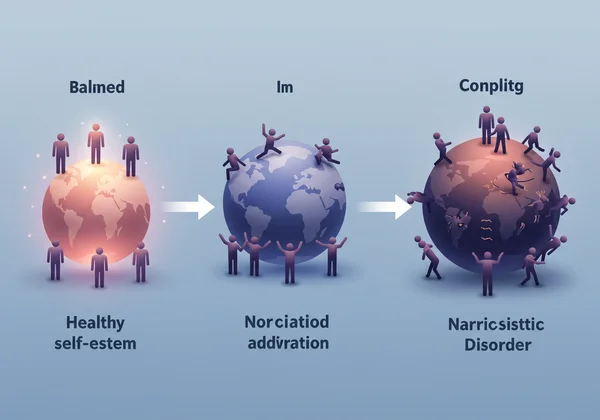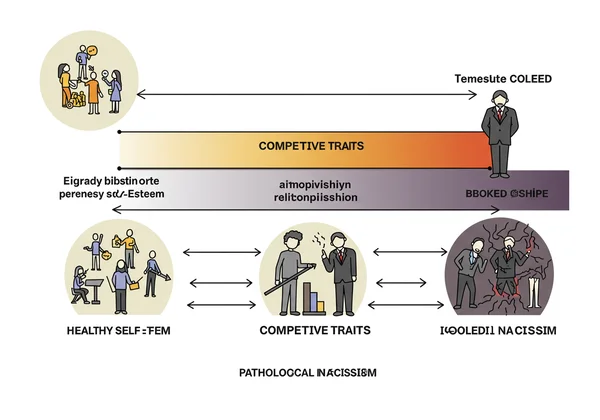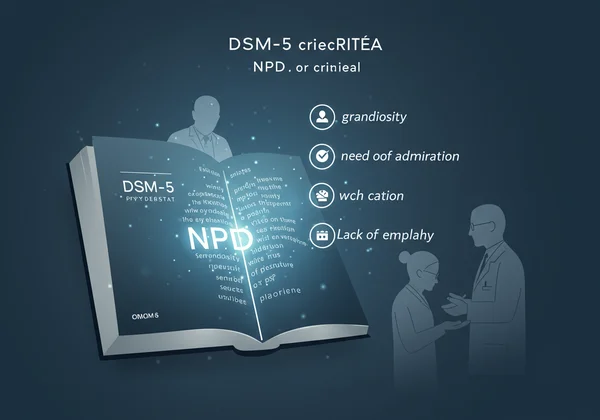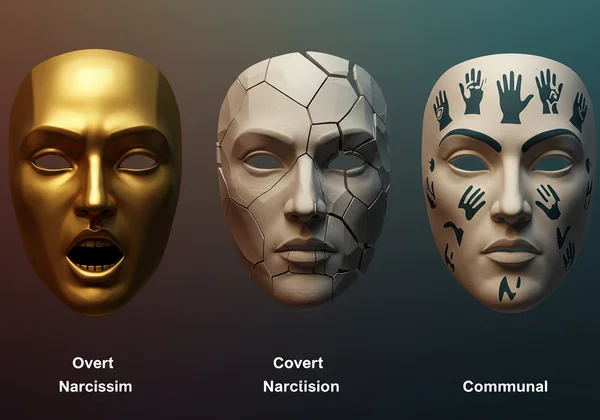The Narcissistic Spectrum: An Ultimate Guide to Narcissism, NPD, and Our Narcissist Test
October 8, 2025 | By Rowan Thorne
You've likely heard the term 'narcissist' thrown around, often used to describe anyone who seems a bit too confident. But the truth is far more complex than a casual label. If you're asking yourself, "How do I know if I'm a narcissist?", you're already taking a crucial step toward self-awareness. This guide will help you navigate the intricate narcissistic spectrum, from healthy self-esteem to the challenging reality of Narcissistic Personality Disorder (NPD). For a personalized starting point, our free narcissist test can help you explore your traits and begin your journey of discovery.

What is Narcissism? Unpacking Core Definitions
At its core, narcissism refers to a focus on the self. While pop culture often paints it as simple vanity, psychology views it as a complex set of personality traits. These traits, like confidence and ambition, aren't inherently negative. They can drive success and foster resilience. The key is understanding where these traits fall on the spectrum and how they impact one's life and relationships.
Beyond the Myth: A Modern View of Narcissistic Traits
Everyone possesses some narcissistic traits. A degree of self-interest is necessary for survival and personal achievement. Healthy confidence helps you pursue goals, advocate for your needs, and feel good about your accomplishments. These traits only become problematic when they are inflexible, excessive, and lead to a consistent pattern of entitlement, exploitation, and a lack of empathy for others.
The Healthy vs. Unhealthy Narcissism Continuum
Imagine a line. On one end is healthy self-esteem, characterized by a realistic and positive view of oneself, balanced with empathy and respect for others. As you move along the line, these traits can become more pronounced. In the middle, you might find someone who is highly competitive and craves admiration but can still form meaningful connections. At the far end lies pathological narcissism, where an inflated sense of self-importance damages relationships and impairs daily functioning. Understanding this continuum is the first step toward self-awareness.

Narcissistic Traits vs. NPD: Understanding the Critical Difference
This is perhaps the most crucial distinction to grasp. Possessing narcissistic traits is common; having Narcissistic Personality Disorder (NPD) is not. NPD is a formal clinical diagnosis that represents the extreme, pathological end of the spectrum. It's the difference between having a confident personality and having a pervasive disorder that dictates your entire way of relating to the world.
When Do Traits Signal a Disorder? DSM-5 Criteria
Psychiatrists and psychologists use the Diagnostic and Statistical Manual of Mental Disorders (DSM-5) to diagnose mental health conditions. For a diagnosis of NPD, an individual must exhibit a persistent pattern of grandiosity, a need for admiration, and a lack of empathy. It's important to understand that a simple online narcissist test or even a detailed narcissistic personality disorder test cannot provide an official diagnosis. Only a qualified professional can do that. However, these tools can offer valuable, private insights into your tendencies and serve as a starting point for deeper reflection.

The Impact of NPD: How it Manifests in Daily Life
For someone with NPD, the need for validation is all-consuming. Their relationships are often superficial, designed to serve their ego. They may struggle to handle any form of criticism, reacting with rage or contempt. This creates a volatile and often lonely existence, where genuine connection is nearly impossible. The disorder's impact extends to family, friends, and colleagues, who may feel manipulated, devalued, and emotionally exhausted.
Exploring the Faces of Narcissism: Overt, Covert & Communal
Narcissism is not a monolith. It can manifest in several distinct ways, and recognizing these types can provide deeper clarity, whether you are examining yourself or trying to understand someone in your life.

The Grandiose Persona: Signs of Overt Narcissism
This is the classic, stereotypical narcissist. They are often charismatic, arrogant, and overtly entitled. They openly brag about their accomplishments, demand the best of everything, and have no problem exploiting others to get ahead. Their need for attention is obvious, and they are often found in leadership positions where they can command admiration.
The Vulnerable Charade: Recognizing Covert Narcissism
The covert narcissist is much harder to spot. Instead of grandiosity, they present as highly sensitive, insecure, and even victimized. Their narcissism is hidden behind a facade of vulnerability. Because their traits are so well-hidden, a covert narcissist test might focus more on questions about hypersensitivity, anxiety, and passive-aggressive tendencies rather than overt grandiosity. They feel secretly superior but are terrified of criticism, leading them to be defensive and passive-aggressive. They manipulate others by eliciting pity and playing the martyr, making those around them feel guilty and responsible for their unhappiness.
The Paradox of Communal Narcissism
This is a lesser-known but equally important subtype. The communal narcissist derives their sense of importance from being seen as the most helpful, caring, and altruistic person in the room. They might lead charity drives or constantly volunteer, but their motivation is not genuine empathy. It is the public recognition and praise they receive for their "selfless" acts that fuels their ego.
What Causes Narcissism? A Look at Origins and Development
There is no single cause of narcissistic traits or NPD. Like most personality structures, it arises from a complex interplay of genetics, environment, and life experiences. Understanding these roots helps foster a more compassionate and less judgmental perspective.
The Blend of Genetics, Environment, and Upbringing
Research suggests that there may be a genetic predisposition to certain personality traits associated with narcissism. However, early childhood experiences play a powerful role. Both excessive pampering that creates a sense of entitlement and severe neglect or abuse that fosters a need for a defensive, grandiose self-concept can contribute to the development of unhealthy narcissistic patterns.
Societal Influences and the Rise of Narcissistic Culture
Some experts argue that modern culture, with its emphasis on social media, celebrity worship, and personal branding, can nurture narcissistic tendencies. The constant pressure to present a perfect, curated life online may encourage a focus on external validation over authentic self-worth, blurring the lines between healthy ambition and an unhealthy need for admiration.
Navigating Narcissism in Relationships: Impact & Strategies
Relationships with individuals high on the narcissistic spectrum can be confusing, painful, and damaging. Recognizing the patterns and learning how to protect your emotional well-being is essential.
Red Flags: Identifying Narcissistic Patterns in Dynamics
Common red flags include love bombing (overwhelming you with affection at the start), gaslighting (making you doubt your own reality), a constant need to be the center of attention, and a profound lack of empathy for your feelings. They may belittle your accomplishments while exaggerating their own and react with anger when you assert your own needs. If this sounds familiar, it may be time to gain some clarity.
Setting Boundaries: Protecting Your Well-being
The most powerful tool you have is setting boundaries. This means clearly and calmly stating your limits and the consequences if they are crossed. It’s not about changing the other person but about protecting yourself. This could mean limiting contact, refusing to engage in circular arguments, or, in some cases, ending the relationship to preserve your mental health.

Paths to Change and Healing: Support for All
Whether you recognize narcissistic traits in yourself or are recovering from a relationship with a narcissistic individual, there are paths toward growth and healing.
If You Suspect Narcissistic Tendencies: A Guide to Self-Improvement
The fact that you're questioning your own behavior is a powerful and positive first step. True self-improvement begins with honest awareness. Understanding your patterns is the key to managing them. A great starting point is to get an objective baseline. Our free narcissist test is designed to provide exactly that—a confidential way to take our free narcissist test and gain insight into where you might fall on the NPI-inspired spectrum. Think of it not as a diagnosis, but as a compassionate tool for reflection.
Healing from Narcissistic Abuse: Rebuilding Self-Worth
Recovering from a narcissistic relationship is a journey of rediscovering yourself. It involves rebuilding the self-esteem that was eroded, learning to trust your own judgment again, and reconnecting with your own needs and feelings. Support groups and therapy can be invaluable resources during this process.

When to Seek Professional Help
For both self-improvement and healing, professional help is crucial. A therapist can provide a formal diagnosis if needed, help you understand the root of your behaviors, and develop healthier coping mechanisms and relational skills. For those recovering from narcissistic abuse, a professional can guide you through the complex emotions and help you build a stronger, healthier future.
Empower Your Understanding: Your Journey Through the Narcissistic Spectrum
Understanding the narcissistic spectrum is a vital journey. It allows us to move beyond simplistic labels and gain a much deeper, more empathetic appreciation of ourselves and others. Whether you're exploring your own tendencies, trying to make sense of a challenging relationship, or simply curious, this knowledge is truly empowering. Remember, that first step towards understanding is often the beginning of real change and healing. If you're ready to start, our confidential narcissist test is a great place to begin. Discover your results and gain deeper insights on our homepage today.
Frequently Asked Questions About Narcissism
What is the real difference between narcissism and NPD?
The main difference is severity and impairment. Narcissism is a spectrum of personality traits everyone has to some degree. Narcissistic Personality Disorder (NPD) is a clinical diagnosis at the extreme end of that spectrum. While a narcissist test can measure traits along the spectrum, a formal narcissistic personality disorder test and diagnosis can only be conducted by a clinician when these traits severely disrupt a person's life.
How do I know if I might have narcissistic tendencies?
Self-reflection is your most powerful tool. Ask yourself if you consistently prioritize your needs over others, struggle with criticism, feel a strong sense of entitlement, or lack empathy. A tool like our online narcissist test provides a structured way to explore these tendencies. Taking this test for narcissism offers a private, preliminary look at your traits, helping you with our online assessment of them objectively.
Can someone with narcissistic traits truly change their behavior?
Yes, change is possible, but it requires significant self-awareness, motivation, and often, professional guidance. For individuals with strong narcissistic traits, the biggest hurdle is admitting the need for change. However, with commitment to therapy and developing empathy, people can learn to manage their tendencies and build healthier relationships.
What are the unique signs of a covert narcissist?
Unlike overt narcissists, covert narcissists appear shy, anxious, or depressed. Their key signs include a victim mentality, extreme sensitivity to criticism (often perceived as a personal attack), passive-aggressive behavior, and a tendency to hold grudges. They feel secretly superior but present themselves as misunderstood or underappreciated.
What are the first steps to dealing with a narcissistic person in my life?
The first step is education—understanding the patterns you are dealing with. The second, and most critical, is to establish firm boundaries to protect your emotional well-being. Avoid engaging in power struggles, focus on your own needs, and build a strong support system of friends, family, or a therapist.